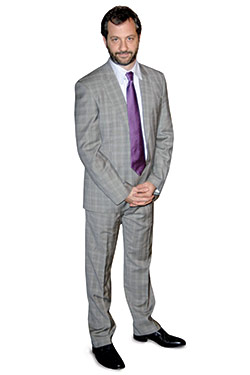
Judd Apatow—writer-director of The 40-Year-Old Virgin and Knocked Up, creator of the groundbreaking series Undeclared, and launcher of a gazillion comedy careers—has edited an anthology for McSweeney’s called I Found This Funny: My Favorite Pieces of Humor and Some That May Not Be Funny at All. Proceeds from the book will go to 826 National, the tutoring organization founded by Dave Eggers. Apatow spoke with David Haglund.
How did this book come about?
Catherine Keener works with 826 L.A., and at some point she said, “You should meet Dave and get involved.” I was a big fan of his first book, A Heartbreaking Work of Staggering Genius. It helped me realize how honest you can be in your creative expression. I thought it would be fun to put out a book with a collection of essays that I find interesting or funny that would contain writing by both my friends and F. Scott Fitzgerald. I’ve actually tricked myself into thinking I wrote the book, rather than just a three-page intro.
What other authors have influenced your writing?
Back in the nineties, Owen Wilson turned me on to A Fan’s Notes, this amazing book by Frederick Exley. Reading that made me think more about what I’m trying to do with my own writing, and to not be afraid of going into dark and scary places.
Did your friends recommend pieces for the book?
James Franco sent me this really long list. And then he asked all his professors, and they sent me really long lists.
In the introduction you mention reading short stories more than novels.
As I say in the intro, not only do I mainly read short stories, I always check out the table of contents and read the shortest stories in any book first. Sometimes that’s all I read. I gave up on a lot of classics. I still have not done Moby-Dick or Tolstoy. I can’t say I ever will.
A lot of pieces in the book aren’t funny, as the subtitle admits.
The subtitle maybe should have been And Most of Them Which Are Not Funny at All. The selection forces you to think about what comedy is. I included one of my biggest influences, Andre Dubus. I would not say his work is funny, but there’s a great humanity to all of his writing. I was very excited to get Raymond Carver in the book, and I can’t say that that story is so funny, either, though I find it to be. There’s a story by Dan Chaon, whose work I have a very emotional reaction to. And one of my favorite pieces is a section from Steve Martin’s memoirs. Everyone in comedy adores that book—it’s like a gift that fell from the sky.
You included a few nontraditional pieces, like Adam Sandler’s SNL sketch “Canteen Boy” and cartoons by Icelandic artist Hugleikur Dagsson.
They are so funny, dark, and disturbing! I was also excited to [include] a television pilot that Robert Smigel and Conan O’Brien did years ago called Lookwell, which they wrote for Adam West. It was one of the first pilots I ever read and one of the funniest pieces of writing I ever read. That’s the kind of thing that no one would have seen again.
I did notice there’s nothing by Woody Allen.
I continue to follow everything he does. He’s very up-front about making movies to avoid existential issues, and I try to think of myself as someone who’s more along the philosophical lines of James Brooks and Cameron Crowe—writers who are looking to say something positive about our time on earth. I’m not as old as Woody, and I still want to feel that life is good and you don’t need to make 90 movies to avoid your fear of death. As much as I love him, I wish he would tell me that things are going to be okay at some point. But I don’t think he will.
Would you ever consider adapting a book or a story?
I assume I will attempt to do that, probably because I’ve run out of my own ideas. But maybe I have enough personal issues and neuroses to keep me busy for the time being. When I get saner, which may never happen, I might be more up for that.
I Found This Funny
McSweeney’s, $25